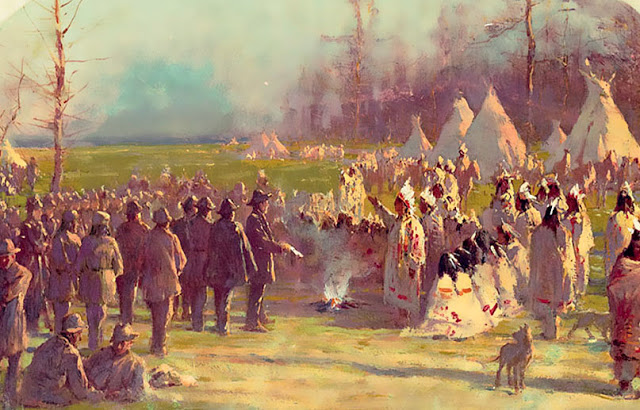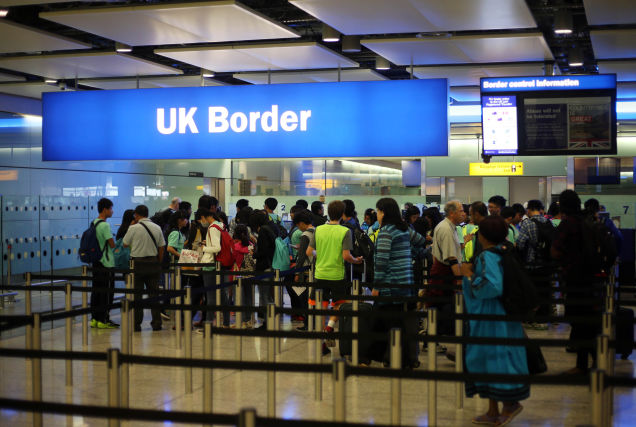The 1816 Treaty of St. Louis is one of the names of a series of fourteen treaties signed between the United States and various Indian tribes from 1804 through 1824. All of the treaties were signed in the St. Louis, Missouri area.
The 1816 Treaty of St. Louis was signed by Ninian Edwards, William Clark, and Auguste Chouteau for the United States and representatives of the “Council of Three Fires” (also known as the People of the Three Fires; the Three Fires Confederacy; or the United Nations of Chippewa, Ottawa, and Potawatomi Indians) residing on the Illinois and Milwaukee rivers. It was signed on August 24, 1816,and proclaimed on December 30, 1816.
These treaties were to form the legal basis in which native tribes were to be relocated west of Missouri in Indian Territory and which was to clear the way for the states to enter the Union.
By signing the treaty, the tribes, their chiefs, and their warriors relinquished all right, claim, and title to land previously ceded to the United States by the Sac and Mesquakie (Fox) tribes on November 3, 1804. By signing the treaty, the Council of Three Fires also ceded a 20 mile wide and 70-mile long strip of land to the United States, which connected Chicago and Lake Michigan with the Illinois River.
The specific land was given up included:
The said chiefs and warriors, for themselves and the tribes they represent, agree to relinquish, and hereby do relinquish, to the United States, all their right, claim, and title, to all the land contained in the before-mentioned cession of the Sacs and Foxes, which lies south of a due west line from the southern extremity of Lake Michigan to the Mississippi river. And they moreover cede to the United States all the land contained within the following bounds, to wit: beginning on the left bank of the Fox river of Illinois, ten miles above the mouth of said Fox river; thence running so as to cross Sandy creek, ten miles above its mouth; thence, in a direct line, to a point ten miles north of the west end of the Portage, between Chicago creek, which empties into Lake Michigan, and the river Deplaines, a fork of the Illinois; thence, in a direct line, to a point on Lake Michigan, ten miles northward of the mouth of Chicago creek; thence, along the lake, to a point ten miles southward of the mouth of the said Chicago creek; thence, in a direct line, to a point on the Kankakee, ten miles above its mouth; thence, with the said Kankakee and the Illinois river, to the mouth of Fox river, and thence to the beginning: Provided, nevertheless, That the said tribes shall be permitted to hunt and fish within the limits of the land hereby relinquished and ceded, so long as it may continue to be the property of the United States.
Many of the chiefs and warriors signed the treaty with an “X”; one wonders whether they fully understood what the treaty would mean, given that they were told they could continue to hunt and fish there forever.
In exchange, the tribes were to be paid $1,000 in merchandise for 12 years. The land was surveyed by John C. Sullivan and this land was originally intended as land grant rewards for volunteers in the War of 1812. Many of the streets in the survey run at a diagonal that is counter to Chicago’s street grid.
The 1821 and 1833 Treaties of Chicago:
The first treaty of Chicago was signed by Michigan Territorial Governor Lewis Cass and Solomon Sibley for the United States and representatives of the Ottawa, Ojibwe, and Potawatomi (Council of Three Fires) on August 29, 1821, and proclaimed on March 25, 1822. The treaty ceded to the United States all lands in Michigan Territory south of the Grand River, with the exception of several small reservations. Also ceded by the Indians was a tract of land, easement between Detroit and Chicago (through Indiana and Illinois), around the southern coast of Lake Michigan, while specific Indians were also granted property rights to defined parcels.
Potawatomi Chief Metea gave the following speech in defense of his land at the signing of the Treaty of Chicago:
Chief Metea
“My Father,—We have listened to what you have said. We shall now retire to our camps and consult upon it. You will hear nothing more from us at present. [This is a uniform custom of all the Native Americans. When the council was again convened, Metea continued.] We meet you here to-day, because we had promised it, to tell you our minds, and what we have agreed upon among ourselves. You will listen to us with a good mind, and believe what we say. You know that we first came to this country, a long time ago, and when we sat ourselves down upon it, we met with a great many hardships and difficulties. Our country was then very large; but it has dwindled away to a small spot, and you wish to purchase that! This has caused us to reflect much upon what you have told us; and we have, therefore, brought all the chiefs and warriors, and the young men and women and children of our tribe, that one part may not do what others object to, and that all may be witnesses of what is going forward. You know your children. Since you first came among them, they have listened to your words with an attentive ear, and have always hearkened to your counsels. Whenever you have had a proposal to make to us, whenever you have had a favor to ask of us, we have always lent a favorable ear, and our invariable answer has been ‘yes.’ This you know! A long time has passed since we first came upon our lands, and our old people have all sunk into their graves. They had sense. We are all young and foolish, and do not wish to do anything that they would not approve, were they living. We are fearful we shall offend their spirits, if we sell our lands; and we are fearful we shall offend you, if we do not sell them. This has caused us great perplexity of thought, because we have counselled among ourselves, and do not know how we can part with the land. Our country was given to us by the Great Spirit, who gave it to us to hunt upon, to make our cornfields upon, to live upon, and to make down our beds upon when we die. And he would never forgive us, should we bargain it away. When you first spoke to us for lands at St. Mary’s, we said we had a little, and agreed to sell you a piece of it; but we told you we could spare no more. Now you ask us again. You are never satisfied! We have sold you a great tract of land already; but it is not enough! We sold it to you for the benefit of your children, to farm and to live upon. We have now but little left. We shall want it all for ourselves. We know not how long we may live, and we wish to have some lands for our children to hunt upon. You are gradually taking away our hunting-grounds. Your children are driving us before them. We are growing uneasy. What lands you have, you may retain forever; but we shall sell no more. You think, perhaps, that I speak in passion; but my heart is good towards you. I speak like one of your own children. I am an Indian, a red-skin, and live by hunting and fishing, but my country is already too small; and I do not know how to bring up my children, if I give it all away. We sold you a fine tract of land at St. Mary’s. We said to you then, it was enough to satisfy your children, and the last we should sell: and we thought it would be the last you would ask for. We have now told you what we had to say. It is what was determined on, in a council among ourselves; and what I have spoken, is the voice of my nation. On this account, all our people have come here to listen to me; but do not think we have a bad opinion of you. Where should we get a bad opinion of you? We speak to you with a good heart, and the feelings of a friend. You are acquainted with this piece of land—the country we live in. Shall we give it up? Take notice, it is a small piece of land, and if we give it away, what will become of us? The Great Spirit, who has provided it for our use, allows us to keep it, to bring up our young men and support our families. We should incur his anger, if we bartered it away. If we had more land, you should get more; but our land has been wasting away ever since the white people became our neighbors, and we have now hardly enough left to cover the bones of our tribe. You are in the midst of your red children. What is due to us in money, we wish, and will receive at this place; and we want nothing more. We all shake hands with you. Behold our warriors, our women, and children. Take pity on us and on our words.”
The second Treaty of Chicago granted the United States government all land west of Lake Michigan to Lake Winnebago in modern-day Wisconsin in 1833. The treaty included lands that are part of modern-day Illinois, as well. The treaty Indians (the Potawatomi) in return received promises of various cash payments and tracts of land west of the Mississippi River (the Indians called the Mississippi River, “Sinnissippi,” meaning “rocky waters”).
At the concluding ceremony for the treaty in 1835, just prior to the evacuation of the Native Americans, five-hundred warriors gathered in the then nascent city (town of Chicago founded in 1833). In full dress brandishing tomahawks, they danced the last recorded war dance in the Chicago area.
In 1848, the Illinois and Michigan Canal was built on the ceded land, and in 1900, the Chicago Sanitary and Ship Canal.













